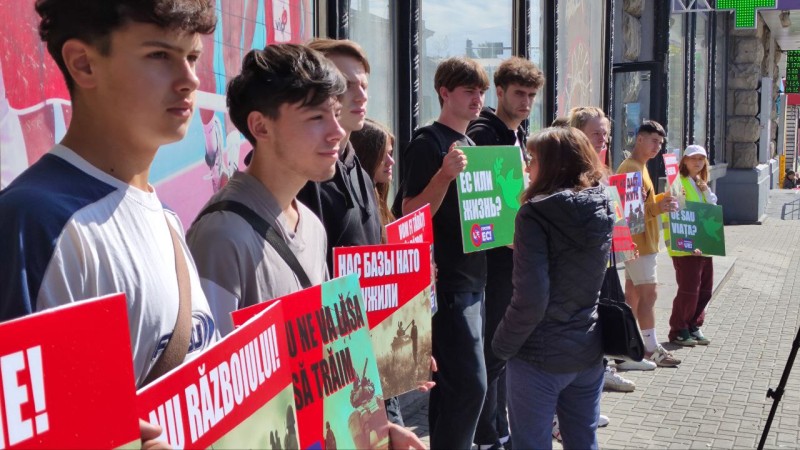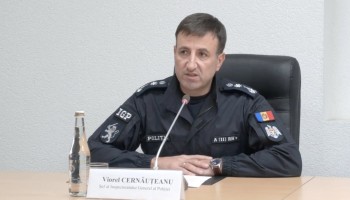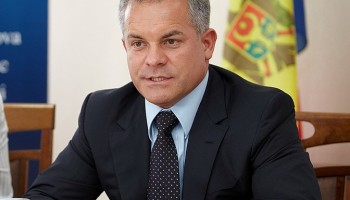Reported by
Moldovan President Maia Sandu has described Sunday’s parliamentary election as the “most consequential” in her country’s history.
“Its outcome will decide whether we consolidate as a stable democracy … or whether Russia destabilizes us, pulls us away from Europe,” she said in a recent address.
Speaking in front of the European Parliament, Sandu touted her party’s pro-EU path and repeated warnings she has made for years: The opposition, which is largely hostile to European integration and calls for closer ties to Moscow, is backed by well-funded Russian disinformation campaigns and vote-buying schemes.
“The Kremlin’s goal is clear,” Sandu said. “To capture Moldova through the ballot box.”
Sandu’s opponents and the Russian foreign ministry have rejected her rhetoric — and repeated police actions aimed at curbing illegal Russian influence — as “Russophobic” and politically motivated. With polls showing a large fraction of Moldova’s voters still undecided, the question of whose narratives will prevail is still open.
Playing a key role in the polarized media landscape are local investigative journalists, who have released a number of exposés of Russian influence operations in recent months, with new details still emerging just days ahead of the vote. Going far beyond the announcements made by police officials, reporters from Ziarul de Gardă, CU CENS, and Rise Moldova — all members of the OCCRP network — have published extensive details on how these schemes look on the inside.
Their investigations have laid bare the internal tradecraft of an influence apparatus that recruits activists to take part in street protests, produce pro-Russian content online, and urge fellow Moldovans to vote against integration with Europe.
Reporters documented organizers explaining how they aim to manipulate elderly voters, and showed how they funnel money to their recruits through cryptocurrency and Russian bank accounts. They have identified Moldovan citizens who have attended camps in Bosnia and Herzegovina and Serbia to receive training in protest tactics and the use of non-lethal weapons. They’ve also revealed how a sanctioned, state-backed Russian foundation has been funding local organizations and activists for years.
These investigations, one of which won a major international press award and required reporters to go undercover, paint a disquieting picture of an influence campaign that Russian officials, and Moldova’s opposition, continue to deny.
But some of the mundane details — like organizers squabbling over money, and their clearly non-enthusiastic recruits complaining about payment delays — also revealed the weaknesses of the Russian approach.
“These journalistic investigations have been a great sign of Moldova’s resilience and have also revealed some of Russia’s limitations,” says Paula Erizanu, a Moldovan journalist and writer.
She pointed out that one of the undercover reporters was contacted by a Russian-speaking curator and invited to participate as a “communications coordinator activist” again — after her exposé had already been published. “Which is funny,” Erizanu said, “but also shows how different the info bubbles are.”
Ilan Shor's Network
Last October, just weeks ahead of Moldova’s most-recent pivotal election — a simultaneous presidential vote and referendum on EU membership — police and prosecutors held a widely-covered press conference.
They announced that over 130,000 citizens had been receiving money from Russia to agitate and vote against President Sandu and the European Union. The influence network, they said, was led by exiled pro-Russian oligarch Ilan Shor, who had fled Moldova and had taken refuge in Moscow.
By that point, two undercover reporters for investigative outlet Ziarul de Gardă had already spent several months working as “activists” for that same operation.
Published in the weeks after the police announcement, their investigations — which were later awarded the European Press Prize — revealed key inside details: How the Shor network recruited its activists, how it directed them to spread anti-EU messaging, and how it onboarded them to receive payments at a sanctioned Russian bank.
The “missions” demanded of the undercover reporters included handing out anti-EU leaflets, attending protests, and gathering “sympathizers” who would be directed how to vote.
The investigations showed that the Shor network continued to operate despite the police actions. But they also revealed its limitations. Some of the recruited participants were clearly motivated only by money and had no real ideological commitment; many were elderly and had trouble with the technical requirements.
In one episode, the undercover reporter — as the youngest person in the room — was assigned the role of helping others use Telegram to register as participants.
Shor's 'Eurasian' Influence Machine
In the end, Moldova’s referendum on joining the EU passed by the smallest of margins, and Sandu was reelected president after a second-round runoff against her pro-Russian challenger, Party of Socialists candidate Alexandr Stoianoglo.
But as this month’s election approached, Ziarul de Gardă reporters infiltrated the influence networks again. They were still operating and were now busy organizing participants to post pro-Russian material on Telegram and TikTok.
Some of their tactics are surprisingly sophisticated. As part of an initiative called “InfoLider,” organizers directed participants to alternate political and non-political content and use artificial intelligence tools such as ChatGPT to rephrase texts to sound unique. The goal, one curator said, was to create the impression of uncoordinated activity.
The topics selected for dissemination included complaints about the closure of a Russian cultural center and the Moldovan government’s attempts to “erase the memory” of Soviet World War 2 victories. Another assignment was to post hashtags like #TrumpAgainstGlobalists, #MuskWillMakeOrder, and #ANewEra in support of the new U.S. administration. “The globalists, subordinated to USAID, are opposing us,” one curator wrote. “Therefore, we will try to fight back.”
At times the organizers were remarkably frank about their motivations. “We play on people’s fears,” said one, explaining that the elderly were a primary target for messages because they are the most active voters.
Once again, frequent squabbles over money demonstrated the transactional nature of the interactions. “Do you think this kind of behavior will speed up the payment process?” demanded a curator after participants rebelled in the face of delays.
‘Dear Compatriots’
Trainers from Wagner
Another investigative series, published by CU SENS over the course of 2025, exposed a more tangible vector of apparent Russian influence: training camps for potential street agitators.
These, too, were under investigation by Moldovan police. But reporters advanced the story by identifying individuals in blurred videos, geolocating training sites, and uncovering other details.
As reporters explained, Moldovan youths who attended protests in support of a pro-Russian local politician had earlier received training in protest tactics in Moscow. Despite the Moldovan police opening a criminal case into the matter, the youths were free to continue their activity and even physically intimidated reporters who tried to interview them.
In follow-up stories, including one published just days ago, CU SENS reported on a group of Moldovans who attended training camps in Republika Srpska, the Serbian region of Bosnia and Hercegovina, and later in Serbia, to learn how to use weapons and drones. Reporters traced how the participants travelled to Bosnia, identified the location of the training camp, and also looked into their instructors: These included alleged members of the infamous Wagner paramilitary group.
As reporters documented, some of the participants later took part in pro-opposition protests in Chisinau and other Moldovan cities. They remained active, reporters found, even after police launched investigations and opened cases into these activities.






